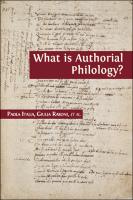What is Authorial Philology?
| dc.contributor.author | Italia, Paola | |
| dc.contributor.author | Raboni, Giulia | |
| dc.contributor.author | PRESOTTO, MARCO | |
| dc.contributor.author | Boadas, Sònia | |
| dc.contributor.author | CENTENARI, Margherita | |
| dc.contributor.author | Feriozzi, Francesco | |
| dc.contributor.author | Marranchino, Carmela | |
| dc.contributor.author | Beloborodova, Olga | |
| dc.contributor.author | Van Hulle, Dirk | |
| dc.contributor.author | Verhulst, Pim | |
| dc.date.accessioned | 2021-03-03T09:30:28Z | |
| dc.date.available | 2021-03-03T09:30:28Z | |
| dc.date.issued | 2021 | |
| dc.identifier | OCN: 1240460808 | |
| dc.identifier.isbn | 9781800640238 | en_US |
| dc.identifier.isbn | 9781800640245 | en_US |
| dc.identifier.isbn | 9781800640269 | en_US |
| dc.identifier.isbn | 9781800640276 | en_US |
| dc.identifier.isbn | 9781800640283 | en_US |
| dc.identifier.uri | https://library.oapen.org/handle/20.500.12657/47023 | |
| dc.description.abstract | "A stark departure from traditional philology, What is Authorial Philology? is the first comprehensive treatment of authorial philology as a discipline in its own right. It provides readers with an excellent introduction to the theory and practice of editing ‘authorial texts’ alongside an exploration of authorial philology in its cultural and conceptual architecture. The originality and distinction of this work lies in its clear systematization of a discipline whose autonomous status has only recently been recognised (at least in Italy), though its roots may extend back as far as Giorgio Pasquali. This pioneering volume offers both a methodical set of instructions on how to read critical editions, and a wide range of practical examples, expanding upon the conceptual and methodological apparatus laid out in the first two chapters. By presenting a thorough account of the historical and theoretical framework through which authorial philology developed, Paola Italia and Giulia Raboni successfully reconceptualize the authorial text as an ever-changing organism, subject to alteration and modification. What is Authorial Philology? will be of great didactic value to students and researchers alike, providing readers with a fuller understanding of the rationale behind different editing practices, and addressing both traditional and newer methods such as the use of the digital medium and its implications. Spanning the whole Italian tradition from Petrarch to Carlo Emilio Gadda, this ground-breaking volume provokes us to consider important questions concerning a text’s dynamism, the extent to which an author is ‘agentive’, and, most crucially, about the very nature of what we read." | en_US |
| dc.language | English | en_US |
| dc.subject.classification | thema EDItEUR::D Biography, Literature and Literary studies | en_US |
| dc.subject.classification | thema EDItEUR::J Society and Social Sciences::JB Society and culture: general::JBC Cultural and media studies::JBCC Cultural studies::JBCC9 History of ideas | en_US |
| dc.subject.classification | thema EDItEUR::D Biography, Literature and Literary studies::D Biography, Literature and Literary studies::DS Literature: history and criticism | en_US |
| dc.subject.other | philology; Authorial Philology; textbook; editing ‘authorial texts’; how to read critical editions; | * |
| dc.subject.other | Textbook | * |
| dc.title | What is Authorial Philology? | en_US |
| dc.type | book | |
| oapen.identifier.doi | 10.11647/OBP.0224 | en_US |
| oapen.relation.isPublishedBy | 23117811-c361-47b4-8b76-2c9b160c9a8b | en_US |
| oapen.collection | ScholarLed | en_US |
| oapen.pages | 214 | en_US |

